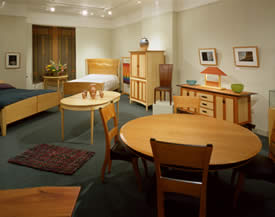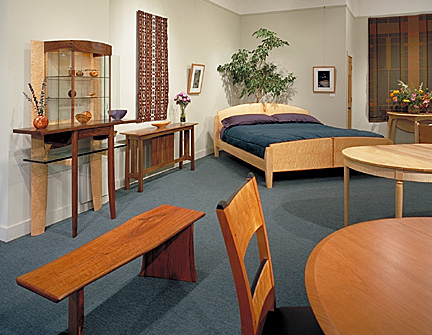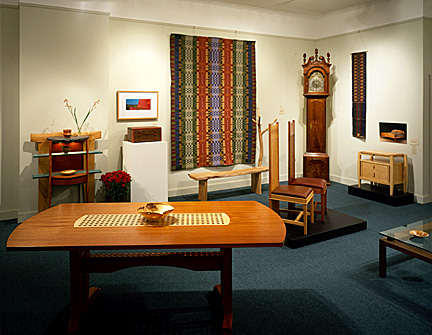Xylos: The Advantages of Cooperation
In our ongoing series of features on artist collectives, this piece by Glenn Gordon describes the cooperative marketing approach taken by Xylos, a design gallery at 3020 W. 50th Street in Minneapolis.



Defying the digital juggernaut, a few woodworkers still persist in making things with their own two hands, not yet willing to let those hands atrophy into the stunted little flippers of the future. Ask any woodworker in the trenches and he will tell you, however, that it isn’t enough, professionally, to be able to make a thing well, or to do beautiful work as a matter of high principle alone. You have to be able to sell it, or you won’t rise to make another the next day. There may once have been a time—-before industrialization displaced craft as the activity integral to human community that it was for so many centuries–when the ordinary crafted object, made in response to necessity, was more or less able to sell itself, but those days are over. Now we have something called “marketing.”
The question that looms before the furniture maker or any other person still left standing in the crafts is how to sustain the traditions of serious workmanship without losing your shirt. One solution is not to go it totally alone. Usually, woodworkers, toiling in isolation and off the beaten track, have no retail presence on the street—-people barely know that they exist. Some woodworkers hook up with galleries to get their work before people’s eyes, but commercial gallery markups put the pieces out of the reach of most consumers. Moreover, the setup tends to invite the kind of craft that panders to royalist or splashy arriviste tastes, encouraging the production of novelties that answer to the boredom of people with money to burn rather than works that are quietly good and sufficiently self-assured that they do not have to scream at you.
Taking a different tack, a group of independent craftsmen several years ago took matters into their own hands and founded the cooperative Xylos: A Gallery of Fine Woodwork, on busy West 50th Street near the corner of Xerxes in south Minneapolis. “Xylos” is the Greek word for wood, and the gallery is devoted almost exclusively to displaying furniture and other objects made of it. For most of the participants, the economics of membership in Xylos are a lot easier to handle than conventional consignment arrangements with commercial galleries. The co-op makes it possible for them to display their work without surrendering every penny it makes in the process.
Xylos is run by a board of directors and two committees, one of which sees to the practical day-to-day issues of running a retail store, the other addressing marketing, including the publication of Xylos’ brochure and maintenance of the Xylos website. The co-op currently has twelve members, but the number fluctuates with the ups and downs of the economy. In the past, there have been as few as six woodworkers and as many as fourteen.
A woodworker wishing to become a member is first screened by the board of directors. If the work is considered up to the gallery’s standards, the candidate is then accepted or rejected by vote of the entire membership. Each member pays an equal share of the rent and upkeep for the storefront. The amount varies with the number of members. Currently it’s $120 a month but it has slid up and down from $75 to $190 depending on the co-op’s shifting circumstances. The members rotate minding the store. Each one is obliged to hold down the fort a couple of days a month, and while behind the counter, is expected to represent the interests of every craftsman in the group.
Xylos isn’t a large showroom but there is space to display strong examples of each of its members’ skills. Sometimes these sample showpieces sell but on the whole the showroom is better at generating commissions than it is at selling works off the floor. For any work commissioned through Xylos, the craftsman pays the co-op a commission of 7-1/2 percent.
On entering the store, you come upon a lectern containing portfolios of the work of each person in the co-op. The portfolios amplify the work on the floor, demonstrating more fully the range of each designer’s ability and style. Since each of the artisans has been juried in, the work, for the most part, is done to fairly high standards. The workmanship varies from good and solid all the way up to consummate and breathtaking. Some of the craftsmen are self-taught, others have trained at the best schools in this country and abroad. There is no unifying style to the work in Xylos–it is an eclectic place housing the work of twelve distinct individuals, each pursuing his own aesthetic preoccupations. A look at the brief biographies on the Xylos web site (www.xylosgallery.com) will give you a sense of each one’s slant on things, but the better thing to do is pay a visit to the store itself. Xylos is in a continual state of evolution, its cast of characters changing with the tides of fortune. A few of its past and current members have gone on to bigger things, the co-op having served as a place from which to launch into the national and international market for fine woodworking. Co-ops like this one, brother-and-sisterhoods devoted to sustaining the traditions of high workmanship and surviving at it, give hope that the hand still has a fighting chance in the marketplace.
Xylos: A Gallery of Fine Woodwork
3020 West 5oth Street
Minneapolis 55410
tel. 612.922.1702
hours:
closed Mondays
Tues.-Fri. 10 a.m. – 6 p.m
Sat. 10 a.m. – 5 p.m.
Sun. 12 p.m. – 4 p.m.